- The ESHRE Capri Workshop Group. Endometrial bleeding. Human Reproduction Update 2007;13( 5): 421–431.
- Albers JR, Hull Sharon K, and Wesley RM. Abnormal Uterine Bleeding. Am Fam Physician 2004;69:1915-26;1931-2.
About
An understanding of the causes of menstrual period abnormalities is necessary for correct diagnosis and effective treatment.
Heavy, prolonged and irregular menstrual periods can interfere with the day-to-day functioning of a woman. Besides, it could also lead to iron deficiency and anemia. In medical terms, this condition is described as menometrorrhagia. To be more precise, menometrorrhagia is defined as irregular bleeding along with either a heavy flow of more than or equal to 80mL per cycle or lasting for a duration of more than 7 days.
Menometrorrhagia is controlled by treating the underlying cause. In most uterine-related causes, treatment involves pain reduction with painkillers, hormonal treatments and sometimes surgery. In patients with bleeding disorders and thyroid hormone abnormalities, the bleeding normalizes after treating the underlying condition. Iron supplementation is often necessary. In rare cases, the bleeding may be excessive so as to necessitate blood transfusion.
Causes of heavy menstrual bleeding are:
Local Uterine and Ovarian Causes: These include:
- Fibroids: Fibroids are benign tumors of the muscle of the uterus. They cause heavy bleeding. Other symptoms include pelvic pain and pressure, discomfort during sexual intercourse and a need to urinate frequently.
- Polyps: Endometrial polyps are outpouchings of tissue from the inner lining of the uterus that remain attached to the inner lining by means of a stalk. Symptoms include vaginal discharge, vaginal bleeding after intercourse, and irregular, heavy and painful menstrual periods. Polyps are removed through surgery, cautery or laser therapy.
- Infection: Infection especially with sexually transmitted diseases like gonorrhea and chlamydia can cause excessive bleeding. The patient also complains of vaginal discharge.
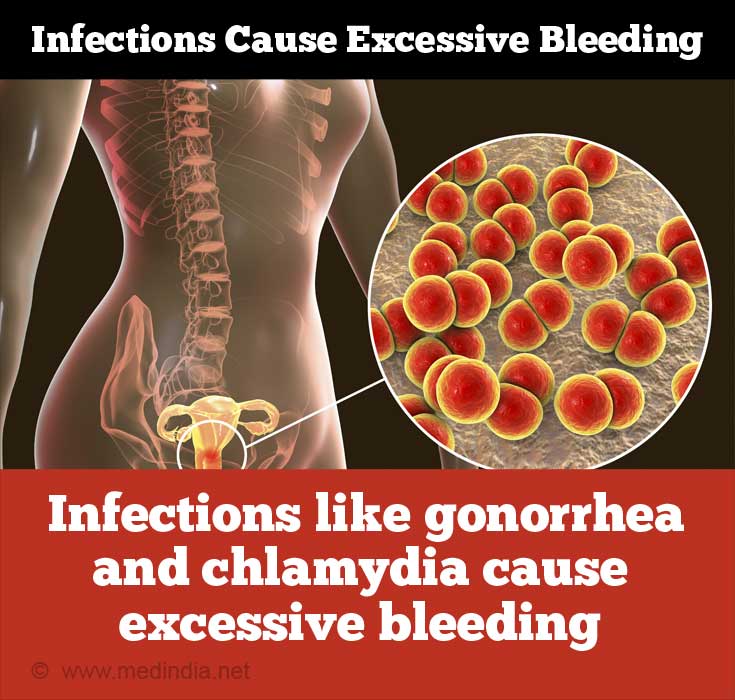
- Adenomyosis: Adenomyosis is a condition where the inner lining of the uterus is excessively thick and invades into the muscle layer. Symptoms include heavy and irregular bleeding, lower abdominal pain, pain during intercourse and bleeding in between periods.
- Dysfunctional Uterine Bleeding: Dysfunctional uterine bleeding is an abnormal bleeding that is not due to any obvious cause. Symptoms may include absent periods, irregular periods, or heavy and painful menstrual periods.
- Pregnancy-related Complications: In a woman complaining of heavy bleeding, it may be necessary to check for undetected pregnancy and rule out any pregnancy-related complications like miscarriage.
- Trauma: Trauma to the uterus, cervix and vagina could result in excessive bleeding, that may be mistaken for menstruation. These patients should also be evaluated for possible sexual abuse.
- Cancers: Cancer affecting the uterus may cause symptoms like heavy and irregular menstrual periods, bleeding after menopause, vaginal discharge, lower abdominal and back pain, fatigue and weight loss.
- Endometriosis: Endometriosis is a condition where the tissue lining the uterus is found in parts outside its normal position. The tissue lining the uterus is normally shed during menstruation. Thus, the abnormally positioned tissue also bleeds during menstruation giving rise to symptoms like pain in the abdomen and lower back, heavy vaginal bleeding, painful and prolonged menstrual periods, and pain during intercourse.
- Ovarian Cysts: Ovarian cysts are fluid-filled sacs present in the ovaries. Symptoms include lower back, abdominal or pelvic pain that may worsen during intercourse. Other symptoms include painful, heavy and irregular menstrual periods. In many cases, ovarian cysts resolve without treatment.
- Copper Intrauterine Device: Contraceptive devices placed in the uterus like Copper-T can cause heavy or irregular bleeding in some women. The device may have to be removed in such cases and replaced by another contraceptive.
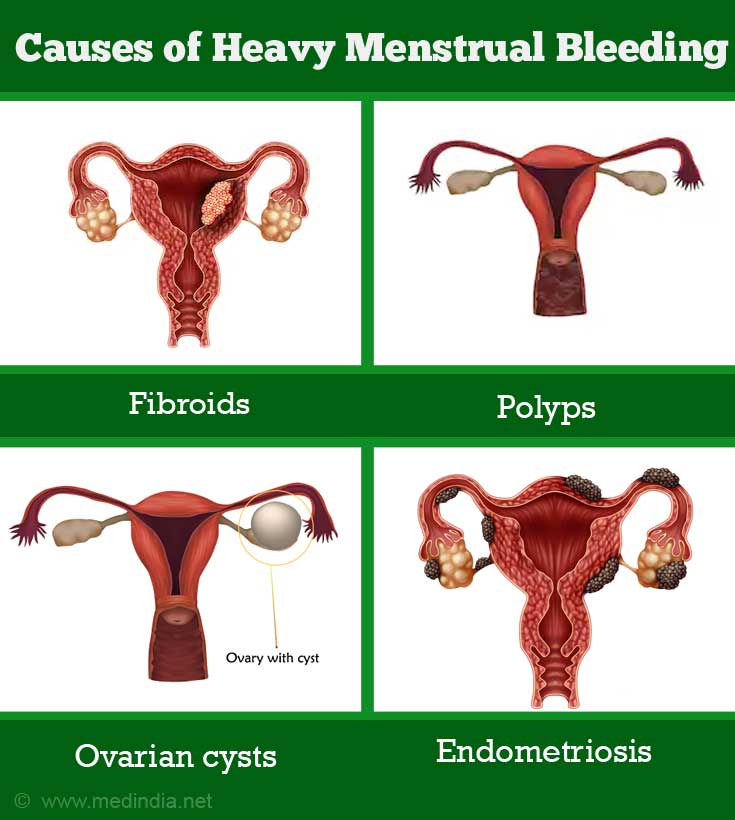
Conditions Affecting the Body as a Whole:
- Bleeding and Clotting Disorders: A bleeding disorder like Von Willebrands’s disease results in excessive bleeding during menstruation. Anticoagulants or blood thinners also may cause increased bleeding. The patient may also show the presence of other features like excessive bruising, repeated nosebleeds, bleeding gums, rectal bleeding and black stools. A patient with a low platelet count may also show similar symptoms.
- Thyroid Hormone Abnormalities: Hypothyroidism or low thyroid hormone levels can cause excessive bleeding. Thus, a thyroid profile testing may be necessary in women with excessive bleeding.
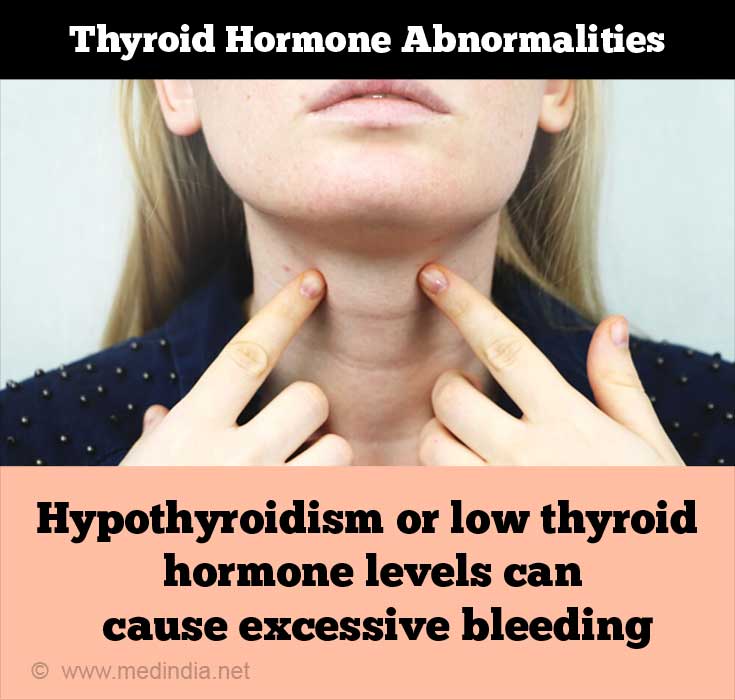
- Chronic Liver Disease: The liver produces various proteins necessary for clotting. Hence, chronic liver disease may be associated with excessive bleeding during menstruation.
- Polycystic Ovarian Syndrome: A woman with polycystic ovarian syndrome has hormonal imbalances. Besides having cysts in the ovaries, the woman also has irregular periods which may be light or heavy, excessive hair over the body and acne.
- Progesterone-only Contraceptives: Use of contraceptives that contain only progesterone give rise to irregular and sometimes heavy bleeding.
Unknown Causes: In some cases, despite repeated tests, the exact cause for menstrual irregularity cannot be pinpointed.
 MEDINDIA
MEDINDIA

 Email
Email







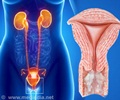


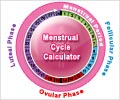



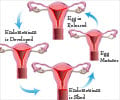
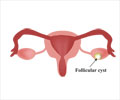








Great post!!!